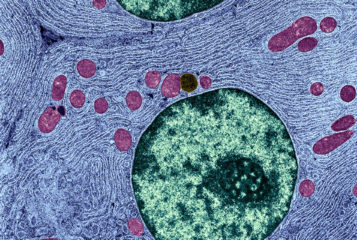UK fertility doctors are seeking permission to trial a new IVF treatment that involves transferring additional mitochondria into egg cells before fertilisation.
Care Fertility, a clinic based in Nottingham, has applied to the Human Fertilisation and Embryology Authority (HFEA) for a licence to conduct a trial involving around 20 IVF patients using the technique, known as Augment.
The trial would see doctors inject mitochondria taken from cells elsewhere in the ovary into the patients' eggs. They hope that, in doing so, they can 'rejuvenate' the eggs to increase the success rate of IVF.
Care Fertility director Professor Simon Fishel told the Independent: 'There is a body of scientific evidence suggesting that the mitochondria of eggs from some patients – those over 37, those previously shown to have poor-quality embryos after IVF – is part of the problem in getting viable embryos for such patients.'
The Augment technique involves replenishing the mitochondria in the eggs with those taken from egg precursor cells – a type of stem cell found in small numbers on the outside of the ovary.
'Previous scientific studies have shown that donor mitochondria in such cases gives better quality and therefore more viable embryos with higher chances of pregnancy,' said Professor Fishel.
Doctors hope that the procedure will eventually benefit women, typically in their thirties and forties, with low-quality eggs. If the procedure is successful, it would also obviate the need for egg donors and allow women to have a genetically related child.
However fertility researchers have reacted cautiously to news of the HFEA application.
Professor Robin Lovell-Badge, HFEA adviser and a specialist at the Crick Institute in London, expressed doubts over the basic science underpinning the procedure, which was developed by US startup OvaScience.
He said it is still unclear whether germline stem cells actually exist within adult ovaries. This notion challenges a longstanding dogma that women are born with a full complement of eggs cells that mature as they grow older.
'My view based on the science is that it's difficult to believe,' he told the Independent.
'There is lots of evidence to suggest there are no germline stem cells remaining in the ovaries of mice, certainly from a week after birth. There is certainly no good evidence in any animal model that there are germline stem cells that actually give rise to oocytes.'
Professor Lovell-Badge said that some experts are sceptical about the Augment technique. 'They [OvaScience] are charging at lot of money to do it and there is not much evidence that it does anything. They may have some information claiming to show that it does, but I've not seen this.'
If the licence is granted, Care Fertility could begin testing the mitochondrial-transfer procedure before the end of the year. Professor Fishel's team would be the first to trial the procedure in the UK. Other trials are already taking place in Turkey, Dubai and Canada but is not being used in the USA after the Food and Drug Administration told OvaScience it would treat the technique as a novel drug.
Sources and References
-
IVF hope for older women as fertility doctors apply to change ÔÇÿbatteriesÔÇÖ in eggs
-
OvaScience hopes new IVF procedure will circumvent ethical and safety issues in Britain
-
Older women more likely to have babies with new technique set to trial in UK this year
-
Why an incredible new method to extend fertility is off limits in the U.S.
-
Turbocharged IVF that'll help older women conceive: Cells taken from other parts of the ovary will boost poor quality eggs leading to greater chance of pregnancy






Leave a Reply
You must be logged in to post a comment.